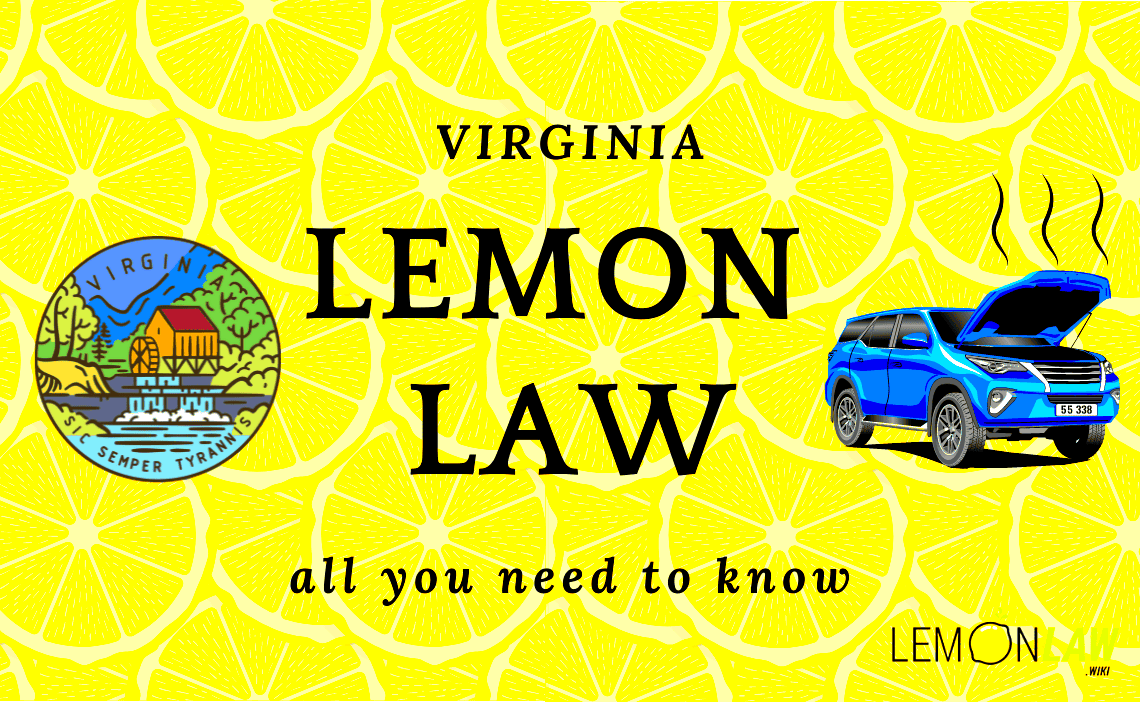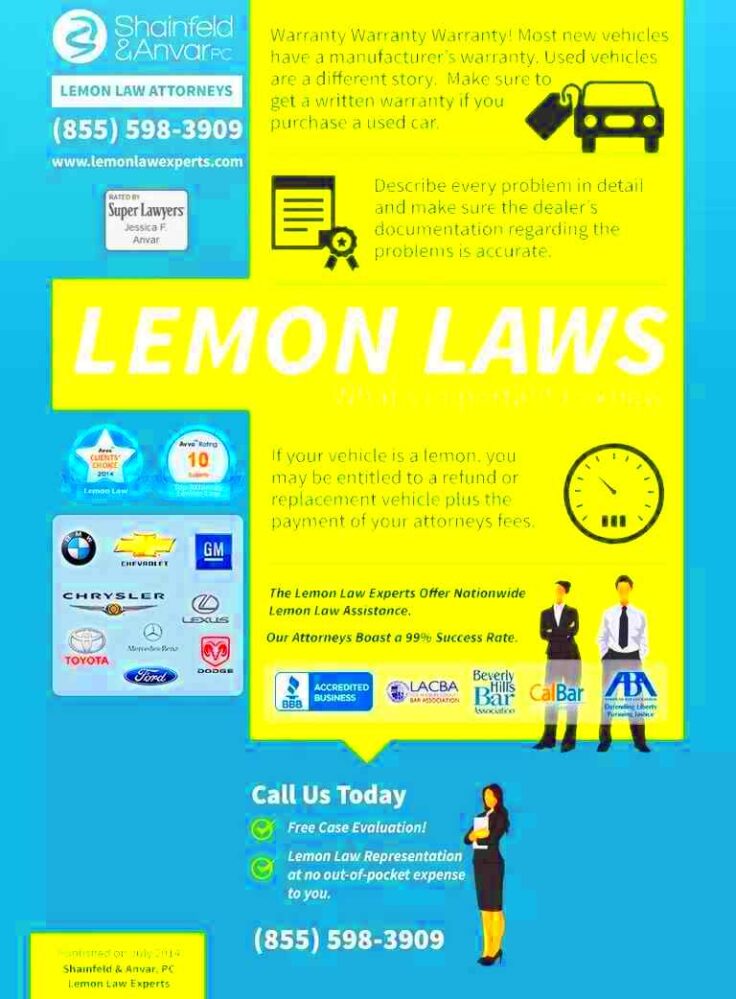Lemon Law in Virginia: What Consumers Need to Know
Lemon Law is a vital protection for consumers who buy or lease defective vehicles. In Virginia, it allows consumers to seek remedies if they purchase a car that has significant defects that affect its use, value, or safety. If you’ve been stuck with a lemon, knowing your rights under this law can help you get the justice you deserve.
Understanding Lemon Law Basics

The Lemon Law in Virginia applies to new and used vehicles that have serious defects, also known as “lemons.” These defects must occur within a specific time frame and limit the vehicle’s normal use, value, or safety. Here are some key points to understand:
- Definition of a Lemon: A lemon is a vehicle that has a substantial defect that can’t be fixed after a reasonable number of attempts.
- Warranty Coverage: The vehicle must be covered by a manufacturer’s warranty at the time the defect occurs.
- Time Frame: Virginia Lemon Law applies to vehicles that are still within the warranty period or within 18,000 miles of use.
Understanding these basics can help you determine if your vehicle qualifies under the Lemon Law and what steps to take next.
Eligibility Criteria for Lemon Law in Virginia
To be eligible for relief under Virginia’s Lemon Law, certain criteria must be met:
- Type of Vehicle: The law covers new and used cars, trucks, motorcycles, and vans purchased or leased in Virginia.
- Defect Severity: The defect must significantly impair the vehicle’s use, value, or safety.
- Repair Attempts: You must have given the manufacturer or dealer a reasonable number of attempts to fix the defect. This usually means at least three attempts for the same issue.
- Time Requirement: The issue must have occurred within the first 18,000 miles or 18 months from the date of delivery, whichever comes first.
If your situation meets these criteria, you may be able to file a claim and seek a remedy such as a refund or replacement vehicle. Knowing these eligibility factors is crucial for successfully navigating the Lemon Law process.
Steps to Take When Your Vehicle is a Lemon
If you suspect that your vehicle might be a lemon, there are several steps you should follow to protect your rights. Taking these steps promptly can significantly improve your chances of a successful claim under Virginia’s Lemon Law.
- Document Everything: Keep a detailed record of all issues with your vehicle, including dates, mileage, and descriptions of the problems. Save all repair invoices and communications with the dealership or manufacturer.
- Notify the Dealer: Inform the dealership or manufacturer about the ongoing problems. Provide them with your documentation and allow them a reasonable opportunity to fix the issue.
- Request a Final Repair Attempt: If the same issue occurs repeatedly, formally request a final repair attempt. Ensure that you send this request via certified mail for your records.
- Consult an Attorney: If the issue is not resolved, it may be wise to consult a lawyer who specializes in Lemon Law cases. They can guide you on your next steps and the potential for filing a claim.
Taking these steps ensures that you’re well-prepared when moving forward with a Lemon Law claim. The better your documentation, the stronger your case will be.
Filing a Lemon Law Claim in Virginia
Once you have taken the necessary steps and are ready to file a claim, here’s how to proceed:
- Prepare Your Documentation: Gather all the documentation you’ve collected, including repair orders, communication records, and any photos of the vehicle’s condition.
- Complete the Required Forms: You will need to fill out specific forms for your Lemon Law claim. These can usually be found on the Virginia Department of Motor Vehicles (DMV) website.
- File Your Claim: Submit your claim to the manufacturer or dealer, depending on who you are filing against. Be sure to do this within the time frame set by the Lemon Law.
- Attend Mediation or Arbitration: Virginia often requires mediation or arbitration before proceeding to court. Be prepared to present your case and evidence during these sessions.
Remember, you can seek legal assistance at any point in this process. Having a knowledgeable attorney can make navigating the Lemon Law much smoother.
Possible Remedies for Lemon Law Violations
If your Lemon Law claim is successful, several remedies are available to you. These remedies aim to make you whole after experiencing the frustration of owning a lemon. Here’s what you can expect:
- Refund: You may be entitled to a full refund of the purchase price, including taxes, fees, and any additional costs related to the purchase.
- Replacement Vehicle: Alternatively, you could receive a replacement vehicle of equal value, if available. This vehicle should be free from defects and in good working condition.
- Payment for Repairs: If you’ve incurred costs for repairs related to the lemon, you may be able to recover those expenses as well.
- Attorney Fees: In many cases, the manufacturer may also be responsible for your attorney fees if you win your claim.
These remedies are designed to provide relief and help you move past the lemon experience. Always ensure you understand the specifics of the remedy you are pursuing and consult with your attorney for the best approach.
Common Misconceptions about Lemon Law
When it comes to Lemon Law, there are many myths that can confuse consumers. It’s essential to separate fact from fiction to understand your rights fully. Here are some common misconceptions:
- Only New Cars Qualify: Many people believe Lemon Law only applies to new vehicles. In Virginia, both new and used vehicles can qualify, provided they meet certain conditions.
- All Car Problems are Covered: Not every issue qualifies under the Lemon Law. Only substantial defects that affect the vehicle’s safety, use, or value count. Minor issues or routine maintenance problems do not.
- One Repair is Enough: Some think that after one repair, a vehicle can no longer be considered a lemon. However, the law requires a reasonable number of repair attempts, often three, before a claim can be filed.
- Filing a Claim is Too Complicated: While the process may seem daunting, it’s manageable with proper documentation and, if necessary, legal assistance. Many consumers successfully navigate the Lemon Law process with the right support.
By understanding these misconceptions, you can better advocate for yourself if you find yourself dealing with a lemon.
Frequently Asked Questions about Lemon Law in Virginia
Consumers often have questions about the Lemon Law in Virginia. Here are some frequently asked questions to clarify common concerns:
- What qualifies as a lemon? A lemon is a vehicle with a significant defect that impairs its use, value, or safety and that has not been successfully repaired after a reasonable number of attempts.
- How long do I have to file a claim? You must file a Lemon Law claim within 18 months or 18,000 miles of purchasing the vehicle, whichever comes first.
- Can I represent myself? Yes, but having a lawyer experienced in Lemon Law can significantly improve your chances of success.
- What if my vehicle is under warranty? Lemon Law applies even if your vehicle is still under warranty, as long as you meet the necessary conditions.
These questions are common among consumers. Knowing the answers can help you navigate the Lemon Law process more effectively.
Conclusion on Lemon Law Awareness
Understanding Lemon Law is crucial for consumers in Virginia. It provides essential protections against defective vehicles and offers recourse when you find yourself with a lemon. By knowing the basics, the eligibility criteria, and the steps to take, you can confidently address any vehicle issues that arise.
Awareness of common misconceptions helps you advocate for your rights and prevents you from being misled. If you suspect your vehicle may be a lemon, don’t hesitate to take action. Consult with a professional and ensure you understand your rights under Virginia’s Lemon Law.
Remember, being informed is your best defense when dealing with potentially defective vehicles.


